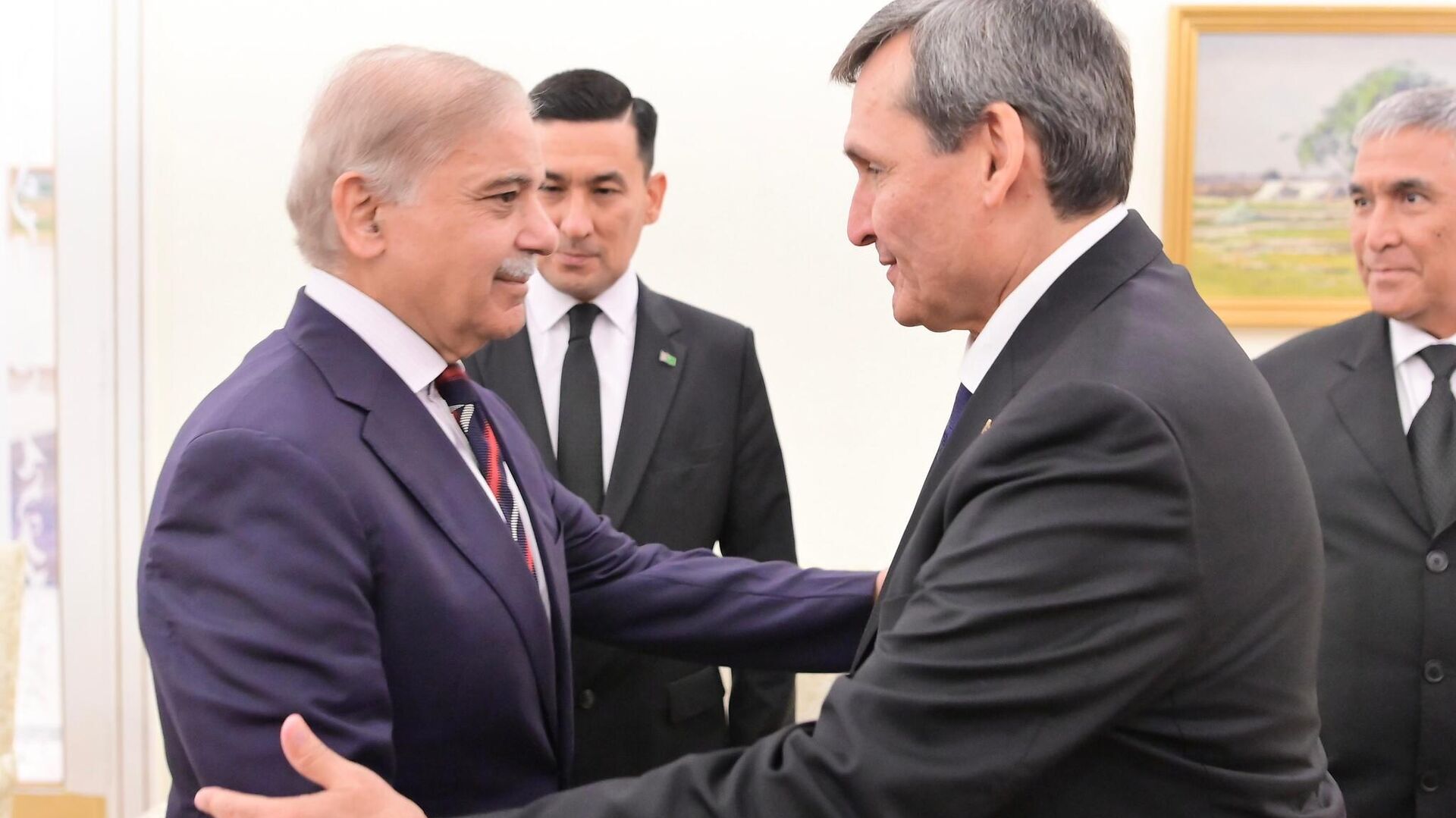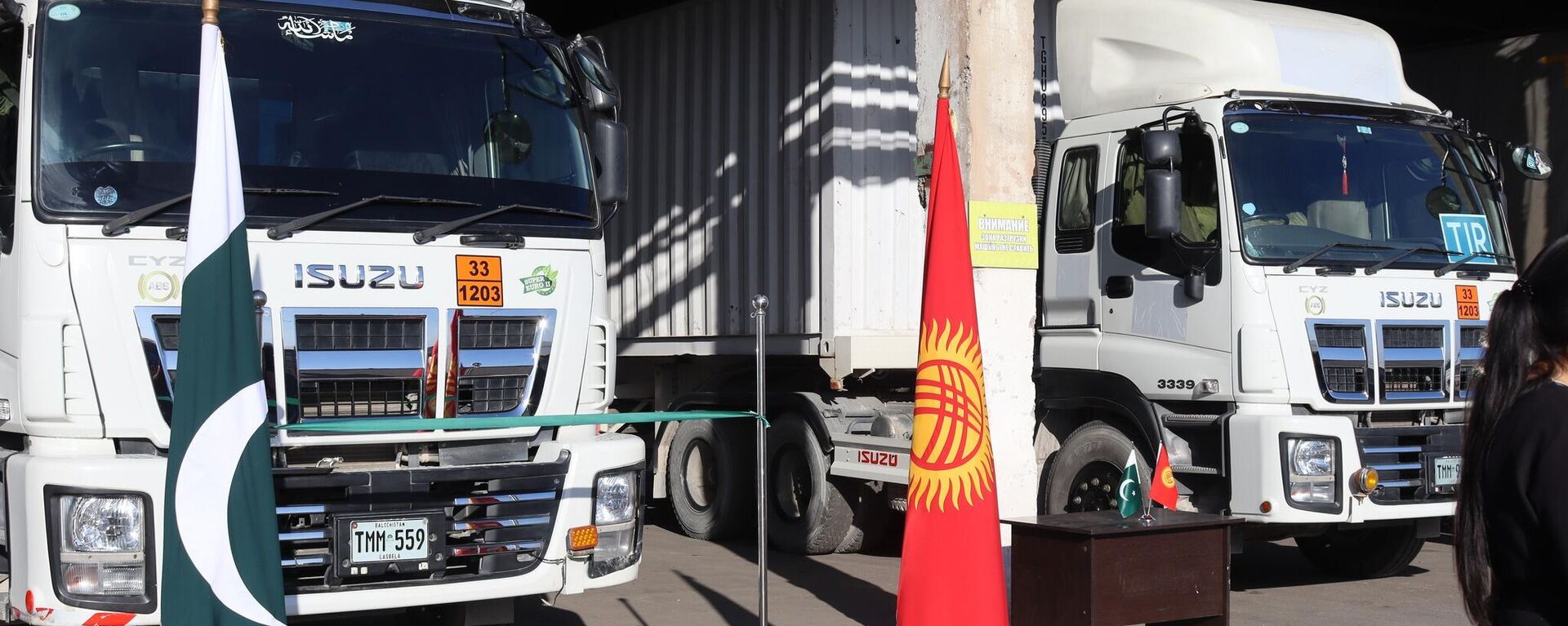https://sputniknews.in/20240724/turkmenistans-fm-visits-pakistan-amid-bilateral-upsurge-in-trade-7884757.html
Turkmenistan's FM Visits Pakistan Amid Bilateral Upsurge in Trade
Turkmenistan's FM Visits Pakistan Amid Bilateral Upsurge in Trade
Sputnik India
The visit of the Turkmenistan top dilomat comes as Pakistan pivots toward Central Asian states seeking growing connectivity and trade ties. 24.07.2024, Sputnik India
2024-07-24T07:00+0530
2024-07-24T07:00+0530
2024-07-24T07:00+0530
shehbaz sharif
pakistan
turkmenistan
islamabad
trade corridor
economic challenges
rising economies
central asia
south asia
national security
https://cdn1.img.sputniknews.in/img/07e8/07/17/7892630_0:615:2048:1766_1920x0_80_0_0_6e7b9bc4a8c7f51de5e0cd16115abf93.jpg
Turkmenian Foreign Minister Rasit Meredow is paying a three-day visit to Pakistan during which he will hold talks with the country's Deputy Prime Minister and Foreign Minister Ishaq Dar, as well as meet Prime Minister Shehbaz Sharif. The resource-rich Central Asian countries need better access to regional markets including Pakistan, China, and Asian countries, a political analyst, Khalid Shikari, told Sputnik India.The talks between the Turkeminstan and Pakistan top diplomats will cover bilateral relations in detail and the leaders will exchange views on recent regional and global developments, according to the foreign office.As Islamabad looks set to bolster trade and investment relations with Central Asian countries, the visit by Turkmenistan's foreign minister comes at a time of growing cooperation between the two states, a former defence attache and political analyst Khalid Shikari claimed in a conversation with Sputnik India.Turkmenistan, rich in natural resources, but a landlocked country with access to only closed Caspian Sea; Pakistan, on the other hand, is geostrategically important due to the Arabian Sea, which leads to the Middle East and the Indian Ocean, according to the expert.However, currently, the country is trying to improve trade and investment relations with allies to stabilise its fragile $350 billion national economy as it faces an acute balance of payment crisis amid rising inflation and surging external debt, he added.He underlined that Pakistan needs to put greater emphasis on economic diplomacy, and continue to produce exportable surpluses in key economic sectors for its new allies in the region.To that prospect, President Asif Ali Zardari in April called for the Transit Trade Agreement (TTA) between Pakistan and Turkmenistan to be finalized at the earliest opportunity to further boost bilateral cooperation of the countries. He also reiterated the need for enhanced cooperation in culture, education, sports, and people-to-people contacts.Meanwhile, enhanced levels of regional connectivity would allow South Asia to emerge as an “important hub of trade between Europe and Central Asia, on the one hand, and South-East and East Asia, on the other, thereby contributing to broader regionalism in Asia and the Pacific,” according to a report published by the UN Economic and Social Commission for Asia and the Pacific (UNESCAP). Notably, Pakistan has entered into various partnerships with an aim of linking up with regional countries. For example, earlier this month, Sharif invited Tajikistan to avail the facilities of Pakistani seaports for transit trade when he was in Dushanbe for a two-day visit.The prime minister informed the president Emomali Rahmon about the operationalisation of the Gwadar seaport in Balochistan province and offered Tajikistan the opportunity to avail the facilities of Pakistan seaports, Shikari said, talking about the importance of the visit.However, looking at some of the challenges that stand in the way of enhanced bilateral relations between Pakistan and Central Asian countries, the former diplomat said that security plays a key role.Strengthening the ongoing cooperation in counterterrorism, combating transnational organized crimes and drug trafficking is crucial also in relations with Turkmenistan, the expert emphasised, assuring that these issues may pose serious risks to the bilateral relations.
https://sputniknews.in/20231207/pakistan-arranges-trade-with-central-asia-and-russia-bypassing-afghanistan-5748084.html
pakistan
turkmenistan
islamabad
central asia
south asia
Sputnik India
feedback.hindi@sputniknews.com
+74956456601
MIA „Rossiya Segodnya“
2024
Aneela Rashid
https://cdn1.img.sputniknews.in/img/07e6/0c/0d/74548_0:0:485:484_100x100_80_0_0_821526e967ae85d041e2d30ee34fa1de.jpg
Aneela Rashid
https://cdn1.img.sputniknews.in/img/07e6/0c/0d/74548_0:0:485:484_100x100_80_0_0_821526e967ae85d041e2d30ee34fa1de.jpg
News
en_IN
Sputnik India
feedback.hindi@sputniknews.com
+74956456601
MIA „Rossiya Segodnya“
Sputnik India
feedback.hindi@sputniknews.com
+74956456601
MIA „Rossiya Segodnya“
Aneela Rashid
https://cdn1.img.sputniknews.in/img/07e6/0c/0d/74548_0:0:485:484_100x100_80_0_0_821526e967ae85d041e2d30ee34fa1de.jpg
shehbaz sharif, pakistan, turkmenistan, islamabad, trade corridor, economic challenges, rising economies, central asia, south asia, national security, counter-terrorism, people-to-people ties
shehbaz sharif, pakistan, turkmenistan, islamabad, trade corridor, economic challenges, rising economies, central asia, south asia, national security, counter-terrorism, people-to-people ties
Turkmenistan's FM Visits Pakistan Amid Bilateral Upsurge in Trade
The visit of the Turkmenistan top dilomat comes as Pakistan pivots toward Central Asian states seeking growing connectivity and trade ties.
Turkmenian Foreign Minister
Rasit Meredow is paying a three-day visit to
Pakistan during which he will hold talks with the country's Deputy Prime Minister and Foreign Minister Ishaq Dar, as well as meet Prime Minister
Shehbaz Sharif. The resource-rich Central Asian countries need better access to
regional markets including Pakistan, China, and Asian countries, a political analyst,
Khalid Shikari, told
Sputnik India.The talks between the Turkeminstan and Pakistan top diplomats will cover bilateral relations in detail and the leaders will exchange views on recent regional and global developments, according to the foreign office.
As Islamabad looks set to
bolster trade and investment relations with Central Asian countries, the visit by Turkmenistan's foreign minister comes at a time of growing cooperation between the two states, a former defence attache and political analyst
Khalid Shikari claimed in a conversation with
Sputnik India.Turkmenistan, rich in natural resources, but a landlocked country with access to only closed Caspian Sea; Pakistan, on the other hand, is geostrategically important due to the Arabian Sea, which leads to the Middle East and the Indian Ocean, according to the expert.
However, currently, the country is trying to improve trade and investment relations with allies to stabilise its fragile $350 billion national economy as it faces an acute balance of payment crisis amid rising inflation and surging external debt, he added.
"Pakistan’s macroeconomic growth has happened in bursts, but mostly at times of heightened global importance. Large amounts of financial assistance came in from the West, but this was limited to the periods when the state was considered geostrategically important to the region, like post-9/11 and during the war on terror. Hence, it is no surprise that Islamabad is opening alliances and pivoting toward countries like China, Russia and Central Asian nations such as Turkmenistan, Tajikistan and Azerbaijan to bolster connectivity, trade relations and regional cooperation," the former diplomat stressed.
He underlined that Pakistan needs to put greater emphasis on economic diplomacy, and continue to produce exportable surpluses in key economic sectors for its new allies in the region.
To that prospect, President Asif Ali Zardari in April called for the Transit Trade Agreement (TTA) between Pakistan and Turkmenistan to be finalized at the earliest opportunity to further boost bilateral cooperation of the countries. He also reiterated the need for enhanced cooperation in culture, education, sports, and people-to-people contacts.
"Hence, the current visit of Turkmenistan's foreign minister to Islamabad is another step toward achieving many ambitious goals the two countries have set for their economic cooperation," the former diplomat added.
Meanwhile, enhanced levels of regional connectivity would allow South Asia to emerge as an “important hub of trade between Europe and Central Asia, on the one hand, and South-East and East Asia, on the other, thereby contributing to broader regionalism in Asia and the Pacific,” according to a report published by the UN Economic and Social Commission for Asia and the Pacific (UNESCAP).
Notably, Pakistan has entered into various partnerships with an aim of linking up with regional countries. For example, earlier this month, Sharif invited Tajikistan to avail the facilities of Pakistani seaports for transit trade when he was in Dushanbe for a two-day visit.
The prime minister informed the president Emomali Rahmon about the operationalisation of the Gwadar seaport in Balochistan province and offered Tajikistan the opportunity to avail the facilities of Pakistan seaports, Shikari said, talking about the importance of the visit.
"Sharif highlighted that the Pakistani seaports offer the most efficient, shortest, and economic route for the Central Asian countries to the markets in the Middle East and beyond," Shikari stated.
However, looking at some of the challenges that stand in the way of enhanced bilateral relations between Pakistan and Central Asian countries, the former diplomat said that security plays a key role.
Strengthening the ongoing cooperation in counterterrorism, combating transnational organized crimes and drug trafficking is crucial also in relations with Turkmenistan, the expert emphasised, assuring that these issues may pose serious risks to the bilateral relations.
"However, as both the countries condemn terrorism in all its forms and manifestations, they can apply a multilateral approach to work together for security and eradicate it in the region," Shikari concluded.



